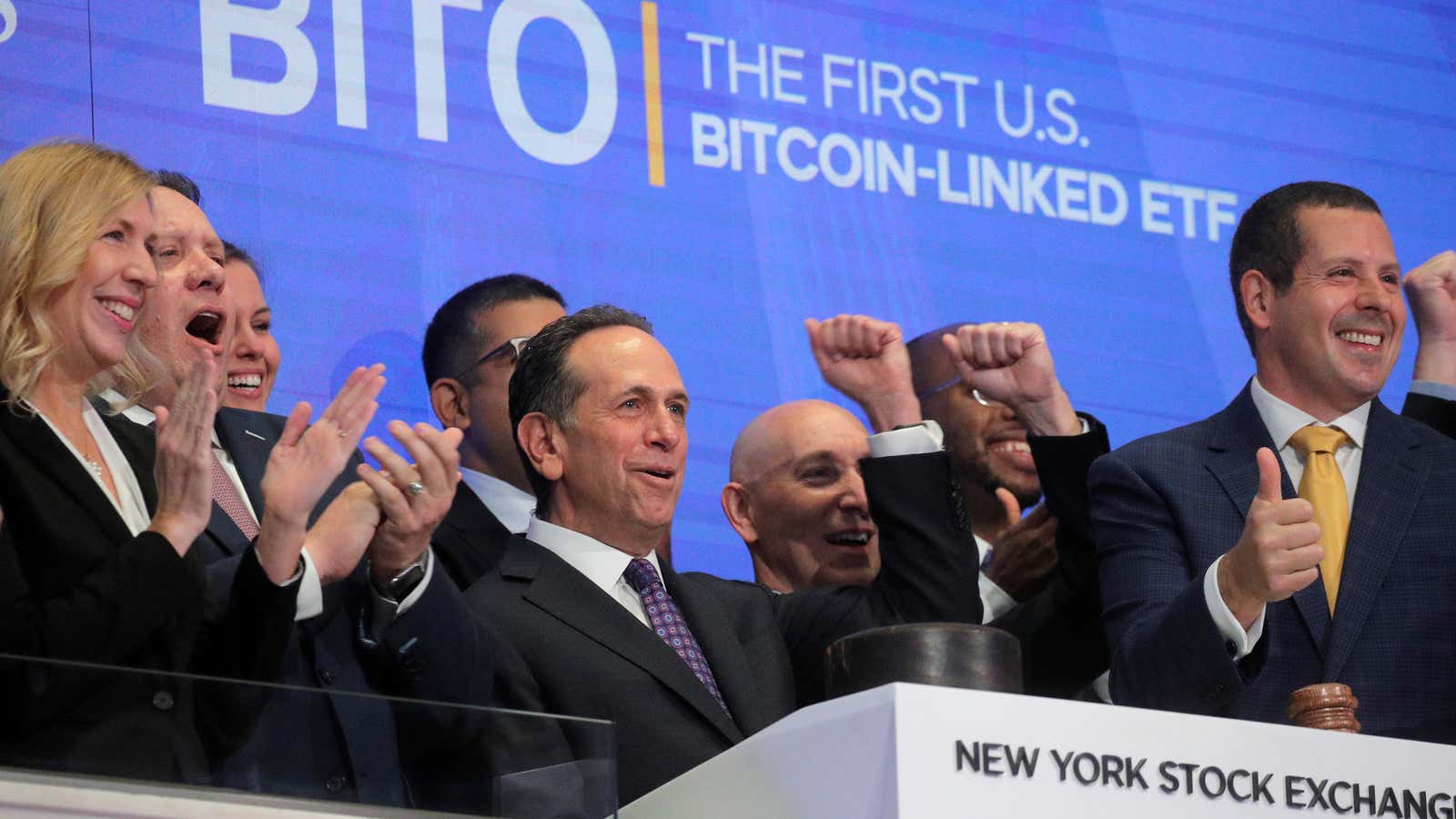Some say bitcoin is a revolutionary force on the verge of transforming the financial industry. But the $7 trillion world of exchange-traded funds promises to bring its own style of disruption to the crypto sector.
This week ProShares launched the first ETF in the US for bitcoin, and it won’t be the last. That matters because ETFs have played a key role in squashing costs and fees out of the asset management industry. These funds are cheap, simple to use, and they’ve saved investors many billions of dollars over the years as expenses drop and people search out the funds that charge the lowest fees. “We call it the ‘great cost migration,'” Eric Balchunas, an exchange-traded funds expert at Bloomberg Intelligence, said in an interview last month. “That’s the mother of all trends.”
The rise of the ETF
An ETF is basically a fund that trades like a stock. They come in thousands of different combinations based on everything from asset classes to geographies. The cost of using them has fallen almost through the floor—the average expense ratio fund investors pay is about half what it was two decades ago, according to Morningstar, the investment research firm. Some of the most popular ETFs charge almost nothing.
Investors of all stripes know that this matters immensely: A $100,000 investment that gains 6% a year for 25 years would be worth $430,000 if there were no fees or charges. Raise those charges to 2% of assets, however, and you only end up with $260,000.
Hefty crypto fees could be in danger
Competition and economies of scale have ground ETF fees to rock bottom levels. That could matter for companies like Coinbase, the exchange-broker-custodian that raked in $1.9 billion in crypto transaction revenue during the second quarter. For its basic tier, the exchange charges somewhere between 1.49% to 9.9% for buying and selling, plus the spread (the gap between the bid and offer prices), according to Bankrate.com. Grayscale Bitcoin Trust, a popular crypto fund, charges a hefty 2% fee. (Grayscale has filed to convert its fund to an ETF, but hasn’t said whether it will change the fees it charges.)
By contrast, a trader using a brokerage app can pay almost nothing to buy and sell an ETF representing the entire US stock market all day long. If those competitive forces are unleashed on the trading of digital assets, the days of fat fees for crypto brokers and exchanges (often one-in-the-same) could come to an end. And while Coinbase CFO Alesia Haas has said that the company isn’t trying to compete on fees, but rather on being trusted, customers are able to weigh that trust against the track record of heavily-regulated financial institutions in the ETF business.
It’s early days, of course. Only one bitcoin ETF exists in the US, and the ProShares fund charges an expense ratio of 0.95%, which isn’t exactly skinny these days. The fund invests in futures, a financial derivative, which come with certain inefficiencies. Virtual-token enthusiasts, meanwhile, have thousands of coins other than bitcoin to choose from on crypto-specific platforms. There are those in the crypto world, like Strike Payments, who say they are also at war with high fees. Discount brokerages have also played a key role in crushing trading costs, and brokerage app Robinhood also has commission-free crypto trading.
But if history is any guide, the ETF industry has a way of solving the legal and regulatory complexities of bringing new assets into the fold. ETF designers will find ways to smooth out the wrinkles, lower costs, and come up with creative new ways to bet on virtual assets.
This has been, genuinely, revolutionary for small investors. Corporate bonds and gold were remarkably difficult and expensive for small-time savers to hold before ETFs came along. As Bloomberg’s ETF Story podcast describes it—gold was a mainstay of central bank vaults and hedge funds, but it was just about impossible for someone with only a little money to own and still diversify their savings. Now investors of all sizes can and do own those assets, and it costs them very little to do so.
US bitcoin ETF had the most popular launch in history
Bitcoin and other crypto assets are similar to gold in that they can be tricky to protect. Online exchanges and wallets for virtual assets can get hacked. If you keep your bitcoin details offline, you may lose those assets for good if you forget your access credentials. The bitcoin ETF, by contrast, has the types of protections and backups that investors are used to.
Maybe that’s one of the reasons the ProShares ETF for bitcoin, despite its flaws, has shoved aside funds for gold and corporate bonds to become the most popular ETF launch in history.
